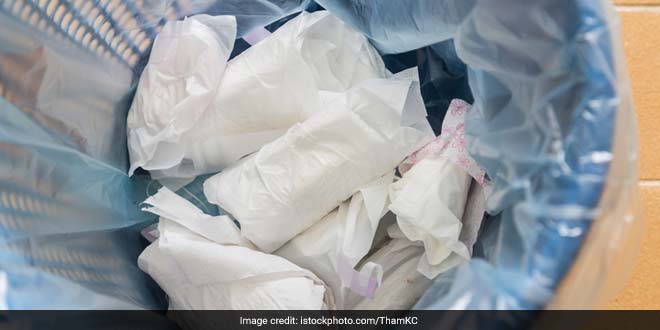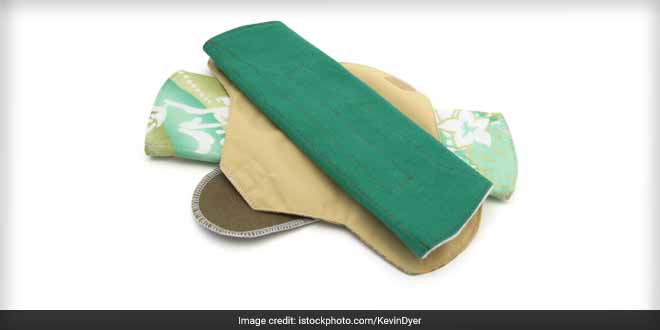These 15-year-old children took it upon themselves to provide rural women in India with the most basic hygiene product – a sanitary napkin. However, these children from Galaxy School in Rajkot, Gujarat went a step beyond and designed affordable do-it-yourself (DIY) pad using waste cloth and towels. These Swachh Warriors – Shayna Shah, Shriya Mehta, Hitarth Raja, and Aashay Rughani also started an awareness campaign to encourage women to openly say, “Yes, I menstruate.” Apart from this, they even taught them how to make their own reusable sanitary napkins. All this was done simply to empower women and save the depleting environment.
Also Read: Make A Green Switch, Use Reusable Menstrual Products
The Start Of The Journey – To Promote Menstrual Hygiene And Save The Environment

Believe it or not, a single woman can generate up to 125 kg of non-biodegradable waste through her menstruating years alone
Did you know a single woman can generate up to 125 kg of non-biodegradable waste through her menstruating years alone? And, India is producing a whooping amount of 1 billion sanitary napkins waste each month. This is when around 88% of menstruating women in India don’t have access to sanitary products during their menstruating days, and opt for alternatives, some very unhygienic, like pieces of rag, ash, sand and husk. Poor menstrual hygiene causes 70% of the reproductive diseases in India. Another grim scenario is that each woman who uses a sanitary pad is unintentionally, polluting the environment. Just in case you don’t know how – One pad takes approximately takes 100 years to decompose, simply because 90% of the sanitary pads are made of non-biodegradable plastic. This disturbing situation bothered these Rajkot students of class 9 and 10 from Galaxy School and that’s when they decided to shatter taboos surrounding periods and sanitary napkins and work on a solution that will solve two vital problems in the country.
Also Read: An Urgent Challenge: Why India Needs To Tackle Its Menstrual Waste
Under the mentorship of Sakina Bharmal, who is a teacher in the Galaxy School, the students designed a swachh innovation – a reusable cloth pad.

A donation rally conducted by the students at school to ask for cloth and towels in order to make their innovation
When Design for Change – a not-for-profit organisation that challenges children to solve problems in their community came to our school, we opened the process of ideas where everyone had to come up with out-of-box concepts in order to solve an ongoing issue. These students after finding out the grim reality behind menstruation came forward to change it. We included both girls and boys in this project because this problem is just not confined to women – it is high time we break that myth, said Sakina Bharmal, Mentor for the students of the school.
The Making Of A Reusable Sanitary Napkin
First, the students started a donation rally at school in which everyone from teachers to students to helpers were asked to bring waste cloth and towels for the project. Then, the students started the process of questioning – they asked the women in the schools who used to help in school work about the sanitary napkins in order to understand their needs and problems they face during their menstruating days.
The students worked closely with the aayamaas of the school in order to understand the need. Because they wanted to find a solution which will solve the real problem and not something which is based on assumptions, added Ms Sakina.
Together with the help of their art teacher and mentor they made prototypes for the sanitary napkins in three different sizes – Small, Large and Extra Large.
Explaining the design of the eco-friendly sanitary napkins, Ms Bharmal said, “We added two towel layers in between the two cotton layers and then stitched it together.”
This prototype came into existence after repetitive hits and trials by the students, initially they made a pad with one towel layers and when they gave it to the school women workers for testing then it was established that these napkins requires two towel layers instead of one layer.
Also Read: A Simple Red Dot On Your Menstrual Waste Can Change A Sanitation Worker’s Life
Why Cloth As A Material?

That’s a DIY sanitary napkin that can fight two problems in India – Menstrual Hygiene and Environment Pollution
The students wanted to solve two issues – provide rural women with sanitary napkins and not over pollute the already polluted environment while being cost effective. That’s why these little warriors decided to use waste cloth and towels as the raw materials, said Ms Bharmal.
The students also made a 5-step manual, both in Gujarati and English, to teach women how to make these DIY Environment-friendly pads at home and sterilise these.
Change Does Not Happen Overnight

A sanitary napkin made out of towel layer which is inserted between the template made of waste cloth with flaps
Simply by designing a sanitary napkin will not solve the crisis, the students realised this and started training the rural women so as they understand the importance of using one.
After few campaigns, the students realised that even the men of the society needed the information about the issues, so they encouraged women to start talking about menstruation to their husbands and in family. The girls usually used to interact with the women of the village while the boys reached out to the men of the society, so that the community in totality is made aware, added Ms Bharmal.
Talking About Impact
Together these crusaders have impacted more than 500 rural women by providing re-usable sanitary napkins.
The future plan is to grow in this field, look out for more sustainable solutions which are environment friendly, as the need of the hour is to make this green switch. Disposing off the pad is becoming a nuisance which needs to be dealt with and dealt in time. The plan is to cover not just rural people but the urban citizens as well, signs off Ms Bharmal.
Also Read: Sanitary Pads With A Difference: How Project Baala Is Empowering Rural Women















































